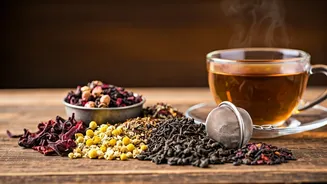Tea and Cholesterol
Herbal teas have gained attention for their potential to support overall health, including heart health and cholesterol management. While research is ongoing,
many herbal teas contain compounds that may help lower LDL (bad) cholesterol and increase HDL (good) cholesterol. These effects are often attributed to the presence of antioxidants and other beneficial substances found in the herbs. When considering herbal teas for cholesterol management, it's essential to understand that they work best as part of a comprehensive approach. This approach should include a balanced diet, regular exercise, and, if needed, guidance from a healthcare professional. Herbal teas are not a replacement for medical treatments but can be a supportive addition to a heart-healthy lifestyle. Always consult a healthcare provider before making significant changes to your diet or health regimen.
Top Herbal Teas
Several herbal teas are commonly associated with cholesterol-lowering benefits. One of the most popular is green tea, which is rich in antioxidants called catechins. These compounds are believed to help reduce LDL cholesterol levels and improve overall cardiovascular health. Another option is hibiscus tea, known for its tart flavor and potential to lower both cholesterol and blood pressure. Studies have indicated that regular consumption of hibiscus tea can lead to a noticeable reduction in LDL cholesterol. Furthermore, the use of oolong tea has also been explored, with some research suggesting it can aid in lowering cholesterol levels. Drinking oolong tea regularly may contribute to improved lipid profiles. When selecting herbal teas, opt for high-quality, pure teas without added sugars or artificial flavors to maximize health benefits. Exploring these different options can help in finding the best choices that suit your taste and dietary needs.
Brewing Tips
Preparing herbal tea correctly is crucial for maximizing its health benefits. Start by using fresh, filtered water, which helps extract the best flavors and properties from the herbs. The water temperature should align with the specific tea type. Green tea, for example, is best brewed with water that's slightly below boiling point, around 170-180°F (76-82°C), to prevent a bitter taste. Hibiscus tea, on the other hand, can handle boiling water. Steep the tea leaves or tea bags for the recommended time, usually between 3 to 5 minutes, depending on the tea. Over-steeping can make the tea bitter. To enhance flavor, consider adding natural sweeteners like honey or stevia. Avoid excessive sugar intake, as it can negate the tea's health benefits. Experiment with different brewing times and ingredient combinations to discover your ideal cup. Proper brewing techniques are not just about taste; they ensure you get the maximum health-boosting compounds from each cup.
Daily Consumption
Incorporating herbal tea into your daily routine can be simple and enjoyable. For managing cholesterol, aim to drink several cups of herbal tea daily. However, it's important to monitor your body's response and adjust accordingly. Start with a moderate amount, such as one or two cups, and gradually increase as tolerated. Timing is also important; drinking herbal tea throughout the day, rather than all at once, can provide sustained benefits. You can enjoy tea at any time, such as in the morning, after meals, or during breaks. However, to maximize its benefits, consume herbal tea without added sugar or excessive sweeteners. For variety, rotate between different types of herbal teas to enjoy a wider range of flavors and nutrients. Combine herbal tea consumption with other healthy habits, like a balanced diet and regular exercise, to enhance overall effectiveness. Consistency is key when using herbal tea as part of a wellness strategy.
Considerations and Precautions
While herbal teas offer several potential benefits, it's essential to be aware of certain considerations. Some herbal teas can interact with medications or may not be suitable for individuals with specific health conditions. For example, those taking blood-thinning medications should consult their doctor before regularly consuming certain teas, such as green tea, due to its potential effects on blood clotting. Pregnant or breastfeeding women should exercise caution and consult with their healthcare provider before including new herbal teas in their diet. It's also vital to source high-quality, organic herbal teas to avoid potential contaminants. Always read product labels carefully and be mindful of any allergic reactions or side effects. If you experience any adverse effects, stop consumption and seek advice from a medical professional. Taking these precautions ensures the safe and effective use of herbal teas for health support. Consulting a healthcare provider is always recommended before making significant dietary changes.



















